
Unique Identity
The betrayal, arrest, trial and execution of Jesus of Nazareth, was unique. It was not His actions that were in question, but His identity. The charge laid against Christ by the Jewish Sanhedrin was blasphemy. The testimony on which He was convicted was concerned with His identity as the Messiah. The interrogation by the Roman governor, Pontius Pilate and the inscription and proclamation placed on His Cross at the execution, dealt with the identity of Christ as the Messiah, the Son of God, the King of kings and Lord of lords. The Illegal Trial The trial of Jesus of Nazareth was completely illegal. At every point it broke the laws of Israel as well as the laws of Rome. It was illegal to conduct a trial at night. It was also against the law to conduct a summary trial without any warning, or opportunity, for the accused to prepare a defense or seek positive character witnesses. At any trial the accused was to be granted an opportunity to prepare a defense and heralds were to be sent out into the area requiring anyone who knew anything positive about the accused to come forward and testify. There was no opportunity granted for appeal. There was no delay between the arrest and trial, between the trial and verdict, between the verdict and sentencing and between the sentencing and execution. Within less than a 24-hour period, Jesus was arrested, tried, condemned, sentenced to death and executed. This blatantly violated all due process of law. 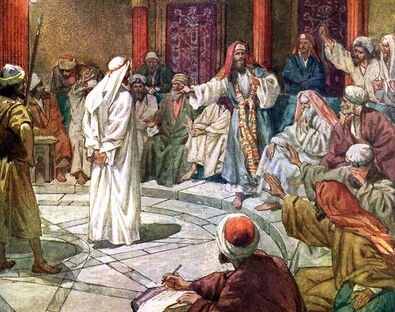
Conspiracy and False Witnesses
It was obvious that there was a conspiracy against the accused. In the event of there being evidence of a conspiracy the judges were obligated to release the accused. In addition, the testimony of false witnesses, brought forward by the accusers, contradicted one another. Condemning the Innocent The Roman governor, Pontius Pilate, acquitted Christ three times: "I find no fault in Him at all." John 18:38 "… I find no fault in Him." John 19:6 "You have brought this Man to me as one who misleads the people. And indeed, having examined Him in your presence, I have found no fault in this Man concerning those things of which you accuse Him. No, neither did Herod, for I sent you back to him and indeed nothing deserving of death has been done by Him." Luke 23:14-15 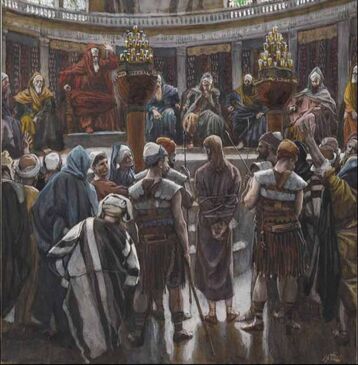
Trial by Mob
"But they shouted saying, 'Crucify Him, crucify Him!' Then he said to them the third time, 'Why, what evil has He done? I have found no reason for death in Him. I will therefore chastise Him and let Him go.' But they were insistent, demanding with loud voices that He be crucified." Luke 23:21-23 Beaten Before Being Tried The Lord Jesus Christ had also evidently been severely beaten by His captors (Luke 22:63-64). In the event of a prisoner having being mistreated in this way, the judge should have been obligated to release the accused. Miscarriage of Justice How could any judge allow someone to be executed whom he had three times declared innocent? What a meaningless gesture for the governor and magistrate to wash his hands claiming that he was innocent of the blood of a person who was clearly the victim of a conspiracy and who, as a magistrate, he should have protected from the mob. 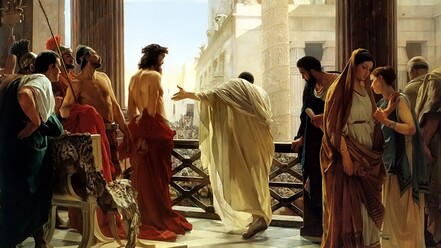
Cowardice and Compromise
"When Pilate saw that he could not prevail at all, but rather that a tumult was rising, he took water and washed his hands before the multitude saying, 'I am innocent of the blood of this just person. You see to it.' And all the people answered and said, 'His blood be on us and on our children.'" Matthew 27:24-25 A Travesty of Justice The trial of Jesus was a travesty of justice. It is a terrifying thing to be judged by the mob. Can you imagine being judged by your worst enemies? Character Witnesses However, today, let us call forward some character witnesses to testify of Jesus. Of course, we could call forth millions of Christians throughout the ages who would eagerly testify to the incomparable goodness and greatness of our Lord and Saviour. However, we will call forward only skeptics and many of them enemies of Christ. Hostile Witnesses for Jesus Thomas Paine, who was an outspoken opponent of Christianity, still admitted in writing: "Jesus Christ was a virtuous and amiable man. For the morality that He preached and practiced was of the most benevolent kind; and while those similar systems of morality had been preached by Confucius and by some of the Greek philosophers, many years before; by the Quakers since and by many good men of all ages, it has not been exceeded by any." 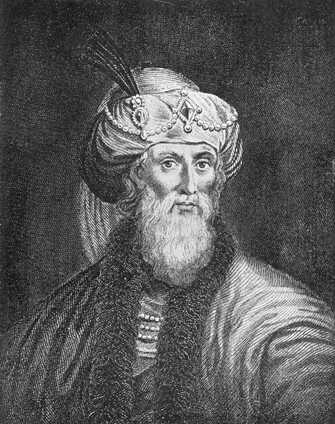
The Christ
The first century Jewish historian, Josephus Ben Mattathias, the author of The Antiquities of the Jews, wrote: "Now there was about this time Jesus, a wise man, if it be lawful to call Him a man, for He was a doer of wonderful works, a Teacher of such men as receive the truth with pleasure. He drew over to Him both many of the Jews and many of the Gentiles. He was the Christ and when Pilate at the suggestion of the principal men among us, had condemned Him to the Cross, those who loved Him at the first, did not forsake Him; for He appeared to them alive again the third day, as the divine prophets had foretold these and ten thousand wonderful things concerning Him. And the tribe of Christians, so named from Him, are not extinct to this day." (Antiquities XVIII, 33) The Greatest Example and Inspiration William H. Lecky was one of the leading historians of the 19th century and the author of The History of the Rise and Influence of the Spirit of Rationalism in Europe. Lecky spent his life advancing the cause of Rationalism, attacking Christianity and the supernatural. Yet, he admitted: "It was reserved for Christianity to present to the world an ideal character, which through all the changes of 18 centuries has inspired the hearts of men with an impassioned love, has shown itself capable of acting on all ages, nations, temperaments and conditions and has been not only the highest pattern of virtue, but also the strongest incentive to its practice and has exercised so deep an influence that it may truly be said that the simple record of three short years of active life has done more to regenerate and soften mankind than all of the dispositions of philosophers and exhortations of moralists." Pre-Eminent John Stewart Mill was perhaps the most influential and respected economist of the 18th century. He often spoke out against Christianity, yet he had to acknowledge: "Christ is still left - a unique figure, not more unlike all of His percusses than all his followers. Even those who had the direct benefit of His personal teaching. It is of no use to say that Christ, as exhibited in the Gospel, is not historical in that we know not how much of what is admirable has been added by the tradition of His followers …who among His disciples, or among their proselytes, was capable of inventing the sayings attributed to Jesus, or of imagining the life and character revealed in the Gospels? Certainly not the fisherman of Galilee. …When this pre-eminent genius is combined with the qualities of probably the greatest moral Reformer and Martyr to that mission who has ever existed on earth, religion cannot be said to have made a bad choice in pitching on this Man as the ideal representative and guide of humanity; nor even now would it be easy, even for an unbeliever, to find a better translation of the rule of virtue from the abstract into the concrete then to endeavour to so live that Christ would approve our life." 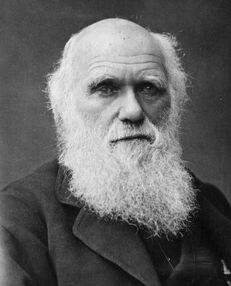
Recognising Reality
Even as determined an enemy of Christianity as Charles Darwin who popularized the theory of evolution had to concede, in an article written for a newspaper in London: "They forget, or will not remember, those who minimize the work of missionaries in pagan countries. They forget, or will not remember, that human sacrifices and the power of an idolatrous priesthood; a system of profligacy unparalleled in another part of the world; infanticide, a consequence of that system; bloody wars where conquerors spared neither women nor children - that all of these have been abolished in these savage islands. That dishonesty and intemperance and licentiousness have been greatly reduced by Christianity. In a voyager, to forget these things is base ingratitude. For should he chance to be at the point of shipwreck on some unknown coast, he will most devoutly pray that the lesson of the missionary may have reached thus far!" Civilising On another occasion, Darwin wrote: "The lesson of the missionary is the enchanter's wand. The house has been built, the windows framed, the fields ploughed and even the trees grafted by the New Zealander. The march of improvement, consequent on the introduction of Christianity throughout the seas probably stands by itself in the records of history." 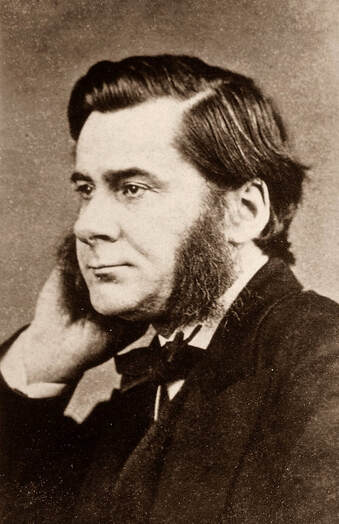
Irreplaceable
Another hostile witness that could be brought to testify of the uniqueness of Christ was Darwin's bulldog, Thomas Huxley. It was Huxley who first coined the word agnostic, which is what he claimed to be. Huxley did more than any other to popularize the theories of Darwinism. Huxley was steadfastly opposed to almost every aspect of Christianity. Yet, in 1870, he wrote for The Contemporary Review: "I have always been strongly in favour of secular education, in the sense of education without theology. But, I must confess that I have been no less seriously perplexed to know by what practical measures the religious feeling, which is the essential basis of conduct, was to be kept up in the presently utterly chaotic state of opinion on these matters - without the use of the Bible. The pagan moralists lack life and colour. Take the Bible as a whole, make the severest deductions which criticisms can dictate and there still remains a vast residuum of moral beauty and grandeur. By the study of what other book could children be so much humanized and made to feel that each figure in that vast historical procession fills, like themselves, but a momentary space and interval between two eternities and earns the blessings, or curses, of all time, according to its efforts to do good and evil?" Conceited Ignorance When a fellow agnostic philosopher debunked the Bible, Huxley rebuked the man for putting on display his "conceited ignorance." Indispensable Huxley even had to go further in admitting: "The Bible has been the Magna Carta of the poor and the oppressed down to modern times. No state has had a constitution in which the interests of the people are so largely taken into account, in which the duties so much more than the privileges of rulers are insisted upon, as that drawn up for Israel. Nowhere is the fundamental truth that the welfare of the state, in the long run, depends upon the uprightness of the citizen so strongly laid down. I do not believe that the human race is yet and possibly never will be, in a position to dispense with the Bible." 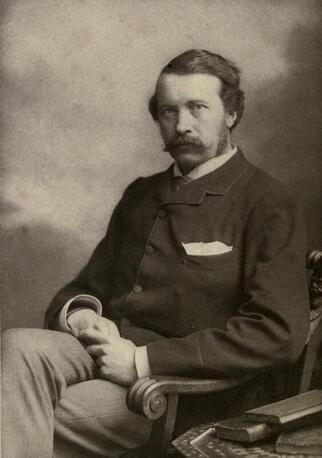
Immeasurably in Advance
Another vocal sceptic who can be called upon to testify of Christ was George Romanes. He wrote many articles against Christianity during his lifetime. Yet, in his book Thoughts on Religion, Romanes observed: "Not only is Christianity thus so immeasurably in advance of all other religions, it is no less so of every other system of thought that has ever been promulgated in regard to all that is moral and spiritual. Whether it be true or false, it is certain that neither philosophy, science, nor poetry has ever produced results in thought, conduct or beauty in any degree to be compared with it. It is the greatest exhibition of the beautiful, the sublime and all else that appeals to our spiritual nature which has ever been known upon our earth. What has all the science, or all the philosophy of the world, done for the thought of mankind to be compared to this one Doctrine - God is Love?" The Dominant Figure in History H.G. Wells who wrote Outlines of History is best known for his science fiction and filmmaking. However, by profession he was an historian. Despite being a very outspoken critic of Christianity, H.G. Wells wrote: "Jesus of Nazareth is easily the dominant figure in history. I am speaking of Him, of course, as a man. For I can see that the historian must treat Him as a man, just as the painter must paint Him as a man. To assume that He never lived and that the accounts of His life are inventions is more difficult and raises more problems in the path of the historian than to accept the essential elements of the Gospel stories as fact. Of course, you and I live in countries where to millions of men and women Jesus is more than a man. But the historian must disregard that fact. He must adhere to the evidence which would pass unchallenged if His book were to be read in every nation under the sun. Now, it is interesting and significant, isn't it, that an historian setting forth in that spirit, without any theological bias whatsoever, should find that he simply cannot portray the progress of humanity honestly without giving the foremost place to a penniless teacher from Nazareth." 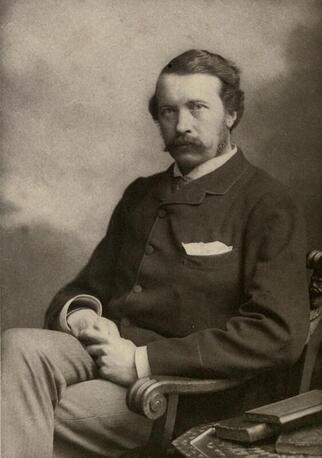
Unparalleled
The final hostile witness which I would like to call to testify of Christ is the brilliant and volatile journalist and writer H.L. Mencken. Mencken dipped his pen in acid whenever it came to writing on Christianity. Mencken was the journalist who transformed the evolutionist's legal defeat in the courtroom at the Scopes trial to a victory in the court of public opinion. In his work: Treaties on the gods, Mencken declared: "This historicity of Jesus is no longer questioned seriously by anyone, whether Christian or unbeliever. The main facts about Him seem to be beyond dispute …it is not easy to account for His singular and stupendous success. How did it come about that one who in His life had only the bitter cup of contumely to drink should have lifted Himself in death to such vast esteem and circumstance, such incomparable and world-shaking power and renown? …It seems to be certain that many persons saw Him after His supposed death on the Cross, including not a few who were violently disinclined to believe in His Resurrection. Upon that theory, the most civilized sections of the human race have erected a structure and practices so vast in scope and so powerful in effect that the whole range of history shows nothing parallel." A Unanimous Verdict So, here we have testimonies of some famous skeptics, some of them Christ's enemies, over almost 2000 years, including: rationalist philosophers, a Jewish historian, some famous evolutionists, a secular humanist journalist, a world renowned economist, a religious sceptic and a famous science fiction writer and Hollywood director. None of them were Christians. They all rejected Christianity. Yet, they all had to acknowledge that Jesus Christ was the greatest Person to ever walk on earth. His impact on history and the Bible's contribution to life and civilization are incomparable. The verdict of these skeptics is unanimous. This One who was born in obscurity, who lived in poverty, who died in agony, became the most important and positive influence in the history of the world. No one has influenced the world for the good more than Jesus Christ. 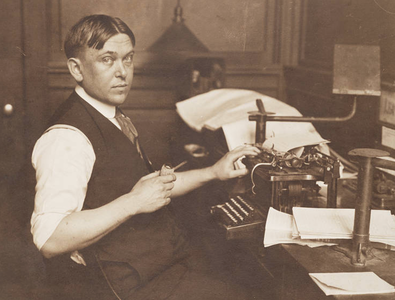
Condemning the Eternal Judge
The chief priests in the Sanhedrin conspired against and condemned Christ. The Roman governor, Pontius Pilate, acquitted Christ three times, declaring Him not guilty and yet he ordered Him to be whipped and crucified to appease the mob in the streets. Pilate then had the audacity to wash his hands in public declaring that he was innocent of this just man's blood. The Day of Judgement Will Come Today many presume to sit in judgement upon Christ. But the day will come when each one of them and each one of us, will stand before the judgment throne of Jesus Christ to give an account of our lives to Him. "It is appointed unto men once to die and after that the judgement." Hebrews 9:27 Jesus Will Judge You and I The question is not so much what you think of Christ – but what does He think of you? The question is not so much what will you do with Christ – but what will He do with you? On the Day of Judgment will you hear: "Well done! Good and faithful servant?" Or will you hear "Depart from Me ye cursed, into the lake of fire prepared for the devil and his angels?" "For we must all appear before the Judgement seat of Christ, that each one may receive the things done in the body, according to what he has done, whether good or bad." 2 Corinthians 5:10 Dr. Peter Hammond Africa Christian Action PO Box 23632 Claremont 7735 Cape Town South Africa E-mail: [email protected] Web: www.christianaction.org.za The above article has been adapted from the book Answering Skeptics by Peter Hammond. The book and MP3 Boxset Answering Skeptics are available from Christian Liberty Books, PO Box 358, Howard Place 7450, Cape Town, South Africa, Tel: 021-689-7478, Fax: 086-551-7490, email: [email protected] and website: www.christianlibertybooks.co.za. See also: The Blood of Christ (for the audio, click here.) Who Killed Jesus? (for a PowerPoint, click here; for the tract in English, click here; for the tract in Afrikaans, click here.) The Cross of Christ (for the audio, click here.) How Can I Know that Jesus is the Messiah? (for the audio, click here; for the tract, click here.) Christ is Risen Indeed! (for a PowerPoint, click here; for the audio, click here; for the tract, click here.)
0 Comments
Leave a Reply. |
.
Categories
|
Archives
Articles Sorted by Date
November 2023
October 2023
September 2023
October 2021
April 2021
June 2020
May 2020
April 2020
March 2020
February 2020
October 2019
August 2019
June 2019
February 2019
August 2017
January 2017
November 2016
March 2016
January 2016
June 2012
May 2012
November 2010
August 2004
August 1993
June 1993
June 1991
August 1989
June 1989
 RSS Feed
RSS Feed
